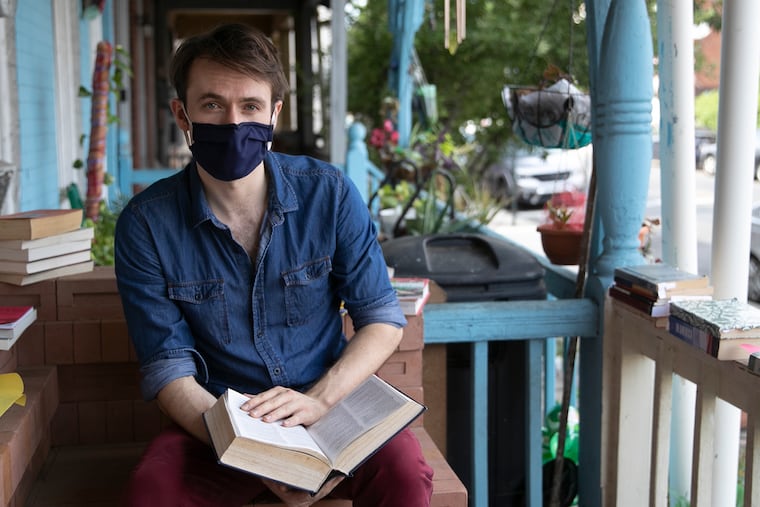A Philly actor’s play for exactly one audience member is a coronavirus quarantine hit
Actor Yannick Trapman-O’Brien has written "The Telelibrary," a work he also performs. The audience comes to him by telephone, one person per show.

When User 108 began to cry, so did Yannick Trapman-O’Brien — at least inside.
But as the voice of the automated operator in the telephone play Telelibrary, he did not cry in character. Never has. Never will. “In Telelibrary, no one can see you cry,” Trapman-O’Brien said.
When the pandemic struck in mid-March, Trapman-O’Brien, like many other creative people abruptly deprived of an outlet for their artistic impulses, began to think about what he, as an actor, could offer to a world so suddenly sad, scared, and lonely. That was particularly true in the world of theater, when the audience, in the traditional sense, disappeared.
What Trapman-O’Brien devised was a work called The Telelibrary. Think of it as personalized phone theater, or maybe Improv One-on-One.
Part comedy, part confessional, and part therapy, dialing into Telelibrary connects the caller to Trapman-O’Brien, speaking in character as the robotic voice of an automated answering system, ready to guide his audience of one through a thicket of choices.
‘A striking encounter’
It’s all very impersonal on its face — and yet, at times, unnervingly personal. Which is how it was that day when User 108 began to cry.
As User 108 progressed through the Telelibrary performance, Trapman-O’Brien as the operator played some recordings of other callers describing what they could see outside their homes. “It was [the User’s] first time they had heard someone else’s voices” since self-isolating, the actor said, describing it as a “striking encounter.”
» READ MORE: Wilma Theater is putting on the acclaimed ‘Is God Is’ as an audio play, recorded from quarantine
Trapman-O’Brien, as the operator, offered to put User 108 on “a brief lyrical hold,” so both could regain composure, although the actor in his role as Telelibrary operator never lost his.
“Yannick was totally crying,” Trapman-O’Brien said. “Yannick was profoundly moved.”
As tempted as Trapman-O’Brien was to abandon his automated voice and comfort the caller, “I have to treat everyone the same. I can’t break the piece.”
User 108 declined the brief lyrical hold. “No, it’s important that you learn this,” Trapman-O’Brien recalled User 108 saying, explaining how isolated life had been. “Tears aren’t bad.”
Lullabies, jokes, and discovery
In 50-minute Telelibrary sessions, callers are prompted to choose among options. In one option, the caller can sing a lullaby. In another option, the caller can access the Lulla-Library and hear recorded lullabies sung by other callers — not only in English, but in other languages, including Spanish, Yiddish, and Russian.
“I adore the Lulla-Library,” Trapman-O’Brien said. In one call, a young child whooped and hollered in an exuberantly giggly version of “Twinkle, Twinkle Little Star.” Another option invites the caller to tell a joke or explain a concept.
Telelibrary “reminds me of a neural network — like a system that is learning,” Trapman-O’Brien said. “One of the things I was trying to chase was that sense of the unknown and the sense of discovery. If you take as little as possible as a given, it’s an invitation to explore whatever you like.”
» READ MORE: In Philly theater, union contracts and digital content are feeling out a way to coexist
There is no Telelibrary script, per se. As the piece has evolved since March 23 with more than 225 performances, what has emerged instead is a series of rules. They morph with every call, subtly changing the nature of the entire work.
Trapman-O’Brien guides himself with a series of if-then prompts, scribbled on the backs of recycled envelopes clipped near his microphone. In his Telelibrary persona, for example, the actor will offer callers an opportunity to earn credits (worth nothing) with this prompt: “Let’s add a credit. Would you like to tell me a story or a joke?”
If the person chooses a story, Trapman-O’Brien will listen and then robotically restate the story and ask for clarification of a key concept. “Thanks, I am learning a lot,” he will say in his automated Telelibrarian voice.
Early in the pandemic, Trapman-O’Brien asked his callers one by one, “When was the last time someone else touched your face?” Then after they answered he’d follow up with another question: “Can you please tell me about that person?”
‘The isolation was very palpable'
“I think the piece is a lot about nostalgia and memory,” he said. “It’s about sharing the small things — the capacity to get outside ourselves and discover ourselves and discover others, too. Part of it is just the companionship.
“There was a while in which the isolation was very palpable,” he said.
Trapman-O’Brien, 27, who lives in West Philadelphia and majored in theater at New York University’s Abu Dhabi campus, calls what he does “applied performance” or “immersive theater.”
When he’s not whittling down his 130-person-long Telelibrary waiting list, he works as a “standardized patient” for student doctors, acting the role so they can practice bedside manners and diagnostics.
He’s also assistant director at Cirque du Nuit, a Philadelphia-based circus and theater group hired for special events, always with the idea of involving the audience in the production. “We want to include them and elevate them,” he said. “It’s about making exchanges. How do you navigate contact with the audience and honor their input?”
“We’re here to reexamine the world,” he continued. “We are looking at what gives us life and nourishes us.”
Callers to “Telelibrary “pay as they wish after the performance, with 20% contributed to the Philadelphia Theatre Emergency Relief grant program, Project HOME, Morris Home, and other groups. Sign up at yannickto.com/telelibrary.